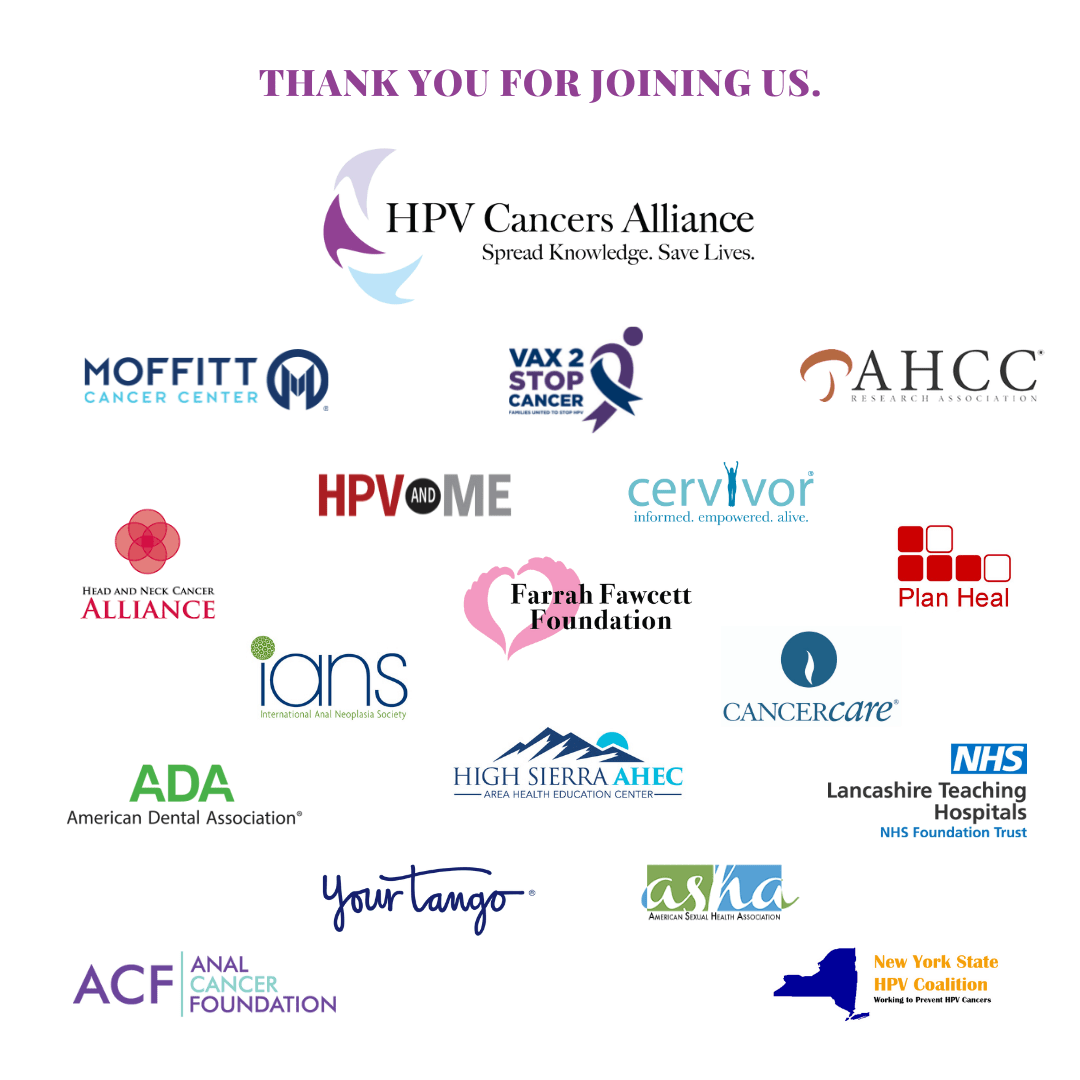|
|
NEWS
HPV Alliance is now HPV Cancers Alliance. When we launched our organization, our goal was to educate the public on Human Papillomavirus and its possible consequences. It was an honorable, but broad mission. Earlier this fall, our leadership team met to further hone the organization's mission, programs, goals, and definitions of success. We also discussed how our work could complement and support the work of other organizations operating in the HPV arena without diluting any one organization's efforts. That strategic meeting provided us with a new name and a new network of partners dedicated to supporting each other in our related missions.
|
HPV Cancers Alliance exists to create awareness and education around the six cancers that HPV causes. Our programs are dedicated to education around cancer symptoms, screening, detection, treatments, recovery, self-advocacy, and improving the survival rates of HPV-associated cancers.
|
|
Our efforts are part of a greater network of "Mission Partners" whose organizations are also dedicated to addressing the Human Papillomavirus and its various cancers. Together, we leverage our expertise and resources to maximize impact with the public, medical community, and legislative bodies. Our collective goal is to save lives. As we move forward, our communications will include information about our Mission Partners and their initiatives.
|
|
|
|

|
|
|
ANAL CANCER NEWS
|
Our partner The Anal Cancer Foundation has partnered with the National Comprehensive Cancer Network (NCCN) to create a first anal cancer treatment guide for patients. This is an important step in providing anal cancer patients with the knowledge they need to advocate for themselves and get the best care.
|
|
|
|
|
|
PAST EVENTS
|
The PREVENT HPV Cancers Town Hall
|
HPV Cancers Alliance hosted a virtual townhall to discuss the PREVENT HPV Cancers Act currently making its way through legislation. Actress Marcia Cross and Executive Director Lillian Kreppel interviewed the co-creaters of Bill H.R. 1550, U.S. Representatives Kathy Castor (FL) and Dr. Kim Schrier (WA).Bill H.R. 1550, also known as the Promoting Resources to Expand Vaccination, Education and New Treatments for HPV Cancers Act or the “PREVENT HPV Cancers Act”, was introduced on International HPV Awareness Day, March 4, 2021.
|
We were joined by Dr. Marcelo Araujo, Chief Science Officer of the American Dental Association. In 2018, The American Dental Association adopted a policy urging dentists to support the use and administration of the HPV vaccine, recognizing it as a way to help prevent oropharyngeal cancer.
|
Also joining the townhall were leading medical experts whose work is impacted by the Human Papillomavirus including:
|
- Dr. Anna Giuliano, Founding Director of the Center for Immunization and Infection Research in Cancer at Moffitt Cancer Center
- Dr. Abraham Aragones, Assistant Professor of Immigrant Health and Cancer Disparities at Memorial Sloan Kettering Cancer Center
- Dr. Judith Smith, Professor, Department of Obstetrics, Gynecology & Reproductive Sciences at UTHealth McGovern Medical School
|
Special thanks to our Mission Partners listed above.
|
|
|
|
|
Anal Cancer Patient Conference
|
|
Saturday, September 25, 2021
|
|
Our Mission Partners at the Anal Cancer Foundation held the inaugural Anal Cancer Patient Conference. Over 440 thrivers and professionals registered for the virtual conference from 20 countries around the world. Anal Cancer Foundation Co-Founder Justine Almada facilitated the day's events. The conference presentations are available on ACF's YouTube and social media (Twitter, Facebook), and we are looking forward to future collaborations to keep the incredible momentum from this event going!
|
|
|
|
|
NOMAN Is An Island: Race to end HPV and 5% of Cancers
|
|
The Anal Cancer Foundation's NOMAN Is An Island Initiative held a major race in France to end HPV. All riders in the event wore END HPV socks -- and then the Anal Cancer Foundation team was placed on the podium. It was a great week for HPV awareness raising!
|
|
|
|
|
|
UPCOMING EVENTS
|
|
International HPV Awareness Day Summit
|
|
Save the Date: Friday March, 4 2022
|
|
Last year, our inaugural event brought together celebrities and leading medical professionals to help educate the public on HPV, destigmatize this incredibly common infection, and promote awareness of the six HPV-associated cancers, and inspire self-advocacy. With the help of our Mission Partners, medical advisory board, U.S. legislators, and celebrity influencers, our 2022 event will be bigger and even better. Stay tuned.
|
|
|
|
RESEARCH & TRIALS
|
In a major step forward for the prevention of anal cancer, the ANCHOR Study has illustrated that we can reduce incidence of anal cancer by treating its cancerous precursor lesions. The National Institutes of Health (NIH) announced that the treatment has shown to be successful in reducing the progression of precancerous lesions to anal cancer.
|
|
|
|
|
|
Retifanlimab: Anal Cancer Clinical Trial
|
|
Although rare, anal carcinoma has one of the fastest increases in cancer incidence and mortality. The most common form of anal carcinoma is squamous cell anal carcinoma (SCAC). SCAC is as an HPV-related disease, with ≈90% of cases reported as having prior or active HPV infections. Currently in the US, the approved standard of care treatment for patients diagnosed with SCAC is systemic chemotherapy.
|
Incyte is currently conducting a Phase 3 global, multicenter, placebo-controlled double-blind randomized study of an immunotherapy called Retifanlimab and is recruiting patients with inoperable locally recurrent or metastatic squamous cell carcinoma of the anal canal (SCAC) not previously treated with systemic chemotherapy for a .
|
|
|
|
|
RTX-321: Anal Cancer Clinical Trial
|
|
Rubius Therapeutics is now enrolling patients in a phase 1 clinical trial of RTX-321 for the treatment of patients with HPV 16-associated cancers, including anal cancer. RTX-321 is an investigational cellular therapy that aims to selectively target HPV 16-associated cancers and potentially induce an immune response against the cancer.
|
|
|
|
|
|
HPV-Positive Oropharyngeal Cancer: Major Dose Reduction Radiation Therapy
|
|
Memorial Sloan Kettering Cancer Center
|
|
In this study, researchers are assessing the effectiveness of using significantly lower doses of radiation therapy (less than half the usual total dose) in combination with chemotherapy in patients with HPV-positive oropharyngeal cancer.
|
|
|
|
|
|
The Federal Drug Administration (FDA) has approved Merck's KEYTRUDA® (Pembrolizumab) plus chemotherapy, with or without Bevacizumab, as treatment for patients with persistent, recurrent or metastatic cervical cancer whose tumors express PD-L1 (CPS ≥1)
|
|
|
|
|
|
For information on anal cancer trials at MSKCC click here.
|
|
For information on cervical cancer trials at MSKCC click here.
|
|
For information on vulvar cancer trials at MSKCC click here.
|
|
For information on oropharyngeal cancer trials at Moffitt Cancer Center click here.
|
|
For information on HPV-associated clinical trials at MD Anderson click here.
|
|
For information on HPV-associated clinical trials at Mayo Clinic click here.
|
|
|
|
IN THE OFFICE
with Dr. Paul Romesser, Radiation Oncologist
|

|
|
Dr. Paul Romesser is a board-certified radiation oncologist at Memorial Sloan Kettering Cancer Center in New York City. He has expertise in using advanced techniques to treat cancer. These include image-guided radiation therapy, intensity-modulated radiation therapy, stereotactic radiosurgery, and proton beam radiotherapy. He is also actively involved in anal cancer clinical trials. Dr. Romesser is a member of the NRG Oncology colorectal and non-colorectal gastrointestinal cancer committees and the National Cancer Institute’s Rectal-Anal Task Force. His work has been published in Nature, Science, Lancet Oncology, Clinical Cancer Research, International Journal of Radiation Oncology and Biophysics, and Cancer.
|
|
|
Interview Topics:
- The best types of radiation treatment for anal cancer
- The 9 questions patients should ask their radiation oncologist
- Advice for finding the best possible cancer center
- Oral Chemotherapy
- Why some patients suffer long-term side effects but others don't
- Why some patients require a full bladder during radiation but others don't
- The benefits of vaginal dilators during treatment
|
|
|
|
|
A Note From the Publisher
|
|
As a patient of Dr. Romesser's, it was especially meaningful for me to conduct this interview. Both HPV Cancers Alliance Executive Director Lillian Kreppel and I were treated by Dr. Romesser. Today, both of us are "No Evidence of Disease" (NED) and neither of us are troubled by the long-term side effects that plague so many anal cancer survivors. I am very grateful I live in New York City and was able to receive the excellent treatment I received from Dr. Romesser at Memorial Sloan Kettering. Like many patients first hearing they have anal cancer, I did not know what I should look for when seeking the best possible treatment. My hope is that this interview will help other patients diagnosed with anal cancer find the best medical care so that they too can have the best possible chance of returning to a normal healthy life.
|
|
|
|

|
SURVIVOR'S STORY
Learning to Thrive
By Mary Guevara
My journey began years ago with an HPV diagnosis at the age of 22. It was 2007, and the Gardasil vaccine was just beginning to hit the American market. Doctors were not very vocal about it. I had precancerous cervical cells, so I underwent a small procedure and was sent on my way. Yearly screening never showed the virus again.
|
Fast forward to 2017. I began to feel itching, bad itching. I was also feeling discomfort near my bottom, but nothing was consistent. I was told by multiple doctors that because of my young age and two recent pregnancies, I most likely just had hemorrhoids, but no one ever checked. I was given cream, which I ironically still had in my medicine closet until recently, and was once again sent on my way.
|
In the summer of 2020, I began bleeding occasionally during bowel movements. COVID had shut down the world, so seeing a doctor wasn’t as easy as usual. Everytime I thought about calling, the symptoms would calm and I would put it off. Eventually my tumor prolapsed, and then I knew something was seriously wrong. However, cancer had still not entered my mind.
|
|
That November I was taken for a colonoscopy which turned into a local resection of a 3.3cm tumor. On November 16, 2020, at the age of 35, I was diagnosed with stage III HPV-related squamous cell carcinoma of the anal canal.
|
|
|
|
|
|
|
|
|
|
   
|
|
|
|